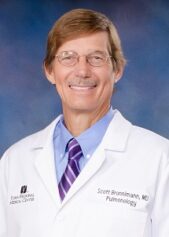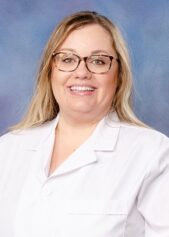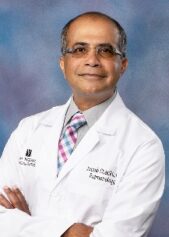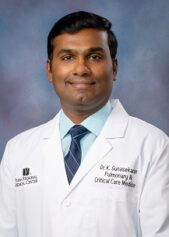Breathe easier with help from our experts.
Being able to breathe freely and easily is something many of us take for granted. When breathing becomes difficult, turn to the specialists at Yuma Regional.
At our full-service clinic, we combine the latest medical science with timely and courteous care to diagnose, manage and treat respiratory conditions so that you can achieve long-term pulmonary and sleep health.
Lung cancer is the second most common cancer in men and women in the United States. Take a free online risk assessment, and discover any potential risks for lung cancer. Knowing your risk will give you the best chance of finding cancer early. This will allow treatment to be most effective – when the cancer is small and before it has spread.
Providers
With specialized expertise, our pulmonologists and clinicians work collaboratively with you to manage an acute illness or a life-long condition. Make an appointment with a Yuma Regional provider today.
Location
Conditions and Services
Our pulmonology specialists care for a full range of respiratory conditions.
- Asthma
- Bronchitis
- COPD (Chronic Obstructive Pulmonary Disease)
- Emphysema
- Lung Nodules
- Pulmonary Fibrosis
- Pulmonary Hypertension
- Sleep Disorders
Your care team will work with you to determine the right treatment plan for you. We provide different treatments and services including, but not limited to:
Bronchoscopies are used regularly to look for problems inside the lungs. The procedure helps diagnose and treat various lung conditions, obtain tissue and fluid samples, investigate a persistent cough, retrieve a foreign object and more.
Chest X-rays are one of our most commonly performed diagnostic tests. A chest X-rays shows the heart, lungs, airways, blood vessels and the bones of the spine and chest. A chest X-ray can also let us see whether there is fluid in or around the lungs or if there is air surrounding a lung.
The Endobronchial Ultrasound Bronchoscopy (EBUS) procedure is a minimally invasive way of diagnosing lung disorders, including cancer, inflammation and infections.
EBUS channels a flexible camera through a person’s mouth and into their windpipe. Pulmonologists can then examine specific areas of concern via ultrasound images. This incision-free process, done under anesthesia, allows for a more comfortable experience and often a shorter recovery for patients.
At Yuma Regional Medical Center, we conduct lung screening exams by using a Low-Dose CT (LDCT). This non-invasive exam takes less than 10 minutes, making it one of the most accessible screening exams. It is designed to detect cancer before a patient develops symptoms because early detection makes cancer easier to treat. Your insurance provider may cover the cost of the screening, or if you are on Medicare, 100 percent of the cost may be covered. We will go over any financial obligation, if any, with you prior to scheduling an appointment.
If you are at high risk for developing lung cancer, scheduling a yearly screening exam before any symptoms appear may lower your risk by as much as 20 percent. People who are considered to be at high risk for developing lung cancer are those who are between the ages of 55-80 who have smoked an average of one pack or more a day for 30 years, even if they have quit smoking within the past 15 years.
It is recommended that individuals at high risk for lung cancer have an LDCT lung screening exam every year until they reach the age of 80. Those with symptoms of a lung condition, such as a new cough or shortness of breath they have never experienced before, are not eligible for LDCT screening and should see their physician immediately.
If you think you qualify and have questions or would like to schedule a screening, please call 928-726-LUNG (5864).
About one in four Low-Dose CT (LDCT) lung screenings will detect something in the lung that may require additional imaging or evaluation. Most of the time, these findings are non-cancerous lung nodules. However, if a small lung nodule is found to be cancerous, cancer can be cured more than 90 percent of the time. We will work with you to establish a treatment plan based on your needs alongside ongoing monitoring.
Spirometry is used to measure how fast and how much air moves in and out of the lungs. This is a noninvasive test that helps diagnose lung conditions. Regular spirometry tests can aid in early diagnosis, which often leads to more effective treatment.




